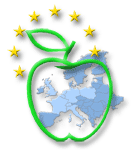Increase product quality and reduction of fungicides
The project HiDRAS aims at the identification of the genetic factors controlling apple fruit quality with the objective of increasing the acceptability of disease resistant apples and therefore their diffusion, leading to a remarkable reduction in the use of fungicides.
Durable agriculture
One of HiDRAS objectives is to supply breeders with new and powerful tools, such as molecular markers linked to fruit quality and pathogen resistance QTLs, to improve selection methods, implementing innovative techniques and exploiting the advantages offered by the most recent biotechnological tools. As stated in the QoL KA5 workprogramme 2001, the proposed research “will provide the scientific and technological basis for the development of new or improved products, corresponding to consumer requirements …”.
European competitiveness
The development of high-quality disease resistant apples
will also increase the competitiveness of European growers towards
non-European countries that currently occupy a large portion of the European
market, especially in late-spring and summer periods when the storability of
the European production (with few exceptions) has reached its end. Any week
by which the storability of European apples can be extended will have
beneficial effects to the financial position to European growers.
European breeder competitiveness will be improved also by
the adoption of molecular tools supplied by this project. As a consequence,
breeding selection strategies will be improved and selection processes will
be speeded-up by using suitable markers for the early selection of complex
traits. This will increase the chance that breeding becomes profitable and
that European breeding programmes continue to exist.
Consumer's attitude towards resistant apples
Apple has always been regarded as "the" healthy food. Consumer needs will be tested in the project to improve consumer acceptance and to assess consumer preferences for apples that contribute to a healthy diet. The development of high-quality disease-resistant apples will increase the trust of consumers towards scientific research and it will modify consumer attitudes towards resistant apples obtained through classical breeding selection, although making full use of the tools offered by the latest scientific innovations.
Perception of European research in genetic area
The commitment of many research groups from all over Europe to find new solutions for the preservation of the environment in apple orchards will have positive consequences on the public perception of the European scientific research, especially in the 'sensitive' plant genetics and breeding area. Promoting the creation and the deployment of new high-quality disease-resistant apples should therefore help to increase the level of confidence and trust of citizens toward scientific research.
Creation of spin-off companies
It can be foreseen that the identification of genes, molecular markers tightly linked to important QTLs and the proof that marker assisted selection is effective in apple breeding, will result in a faster and more powerful selection of the progenies. Those results are expected to favour the development of small biotechnological companies to support breeding stations, supplying highly qualified services for the molecular characterisation of varieties and progenies under selection.





